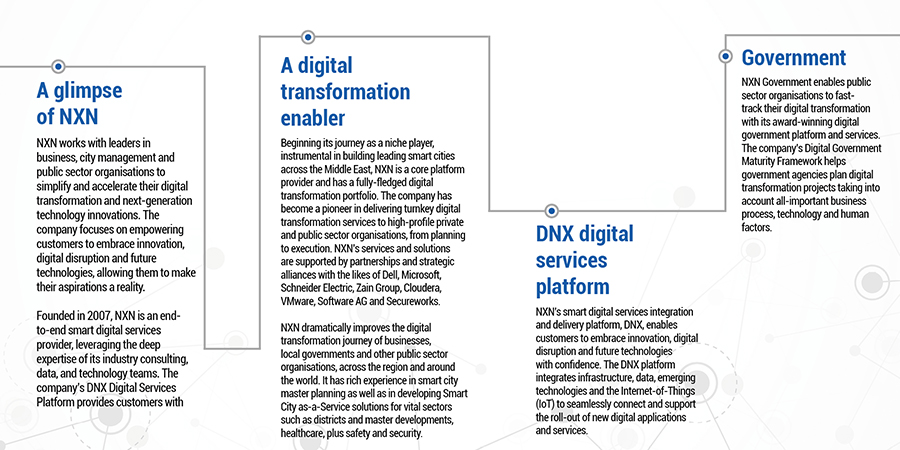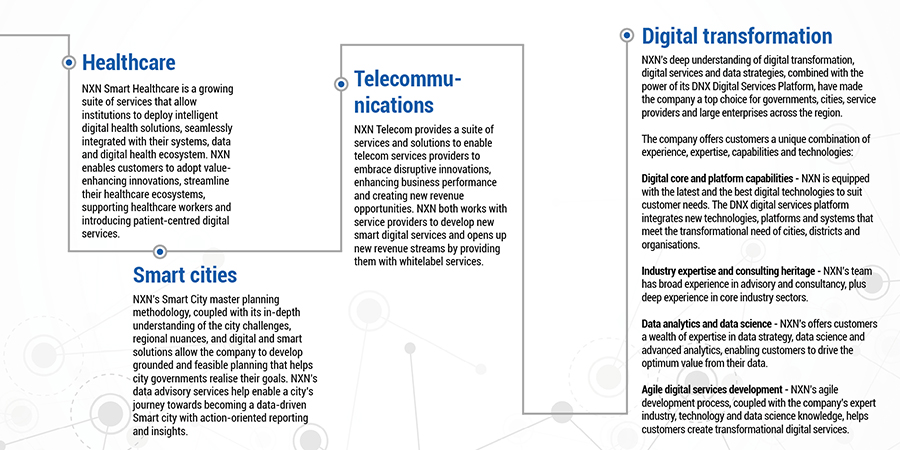NXN has proven to be an expert in digital transformation. 2020 was challenging but according but NXN was up to the challenge. In an exclusive interview with Telecom Review, Ghazi Atallah, CEO, NXN explained why the company is a digital enabler and how telcos will embrace digital transformation in 2021 and beyond.
2020 was a very challenging year. How did NXN help its customers with digital transformation to overcome the new challenges presented by the pandemic?
Last year was a difficult one for many and brought a wide range of unexpected challenges. Fortunately, technology industries were the best equipped to step up to these challenges. NXN, for example, already had the technology and processes it needed to provide the necessary flexibility to work remotely, collaborate digitally and ensure continuity for customer projects.
We are grateful that last year was a busy one for NXN. Whilst it was hardly 'business as usual', we were able to continue to develop and progress customer projects and achieve the desired outcomes. If anything, the circumstances of 2020, actually brought more focus to digital initiatives and how they contribute to business performance.
I believe that Covid-19 helped to both accelerate the confluence of physical and digital worlds and bring focus from leadership on the ways in which digital transformation can help solve real-world problems.
What will be the main points of focus for NXN in 2021?
NXN's focus remains the same, helping governments, cities, service providers and businesses reap the benefits from digital transformation and next-generation technology innovations. And we still have so much to do.
When leaders think of digital transformation, they tend to think of large-scale, all-encompassing initiatives that change, enhance and improve the way they do business across the organisation. Whilst this is often true, the devil is very much in the detail. Ambitious digital transformation initiatives often create monsters that gobble up resources, budget and delay real progress.
NXN works closely with large organisations to define what success means, develop strategy and create a blueprint for digital transformation initiatives. However, what makes digital transformation initiatives work is the very specific definition, alignment and implementation of every service under the overall plan. For that you need the right methodologies, the right business planning, deep expertise in data, new technologies, sector experience, plus the solutions to overcome common data, technology, organisational and business obstacles. That's what NXN brings.
In past interviews with Telecom Review you've referred to NXN as 'an enabler'. What does that mean to customers?
NXN is a digital enabler. We enable smart cities, enterprises and service providers to embrace disruptive technologies and achieve their desired outcomes. In the telco sector, we bring deep understanding of digital transformation strategy, data strategy and data governance, plus the service development and implementation that they need to make progress.
We also partner with service providers to enable them to sell whitelabel smart services to cities, government departments and industry, creating new revenue streams. NXN can also help service providers address specific customer or market needs, developing new smart services that can provide new revenue streams.
Lastly, NXN helps provide telcos with the agility required to transform and the digital savvy to create a service delivery environment. Our role extends beyond advice, products and services, we also manage services and optimise outcomes to enable better performance, cost-savings, new business models and additional revenue streams.
What will digital transformation mean for telcos in 2021?
Digital transformation is both an enormous opportunity for telecom service providers and a tremendous challenge. Telcos traditionally managed infrastructure and connectivity and, over the years, have generally struggled when trying to introduce non-traditional value-added services. The success and global demand for cloud services has now tipped the balance in the telecom sector’s favor again. Today, more and more service providers are offering cloud services, but the market is changing fast.
The whole concept of cloud services is now evolving dramatically and creating an opportunity for telcos to position themselves as core digital transformation service providers. The demand for smart digital services from businesses, government departments and smart cities is growing fast as digital transformation becomes the norm. However, the expertise, time, development and management required for such services have proven to be a significant burden for even enterprise customers. Service providers have a golden opportunity to create, deliver and manage smart cloud services faster and more efficiently than anyone else.
Do you think telcos are ready to lead in the digital transformation space?
Telcos are well positioned compared to other technology businesses. They have the capital, the infrastructure and the connectivity they need, but they have challenges making better use of their data, understanding their customers’ digital transformation needs and being able to deliver smart services that help customers achieve desired outcomes.
Some service providers are moving faster than others, but overall the industry must embrace radical change - the digital transformation of itself - before it can take full advantage of the smart services opportunity.
Are smart cities, government entities and enterprises ready to embrace smart cloud services?
Investment in digital transformation worldwide, and in particular across the MENA region, is growing fast. However, we've now all seen enough costly digital transformation failures to make cities, government and private sector enterprises be much more careful when embarking on new initiatives.
There is now an increasing focus on agility and defining projects that can be implemented quickly and help accelerate better outcomes. This will fuel demand for smart digital services leveraging cloud infrastructure, since they can be defined and deployed easier, faster and cheaper by a service provider. However, when your organisation relies on smart services to underpin your business, trust is a key issue, so you want to make sure your partner has an in depth understanding of both the business objectives you are trying to achieve and the digital technology landscape that would enable these services.
How much risk is involved in smart cities’ digital transformation?
It's no accident that smart city technologies and solutions are the topic of one of Gartner's most popular 'hype cycle' reports. There are lots of new technology innovations that offer great benefits if they can be implemented effectively, problems can be solved and they are aligned to strategy. However, the experience and expertise to leverage these new innovations is hard to come by and many implementations of new technologies fail. NXN was highlighted by Gartner in its most recent Smart City Technologies and Solutions Hype Cycle report as a reference vendor for implementing five key smart city technology solution categories including smart city as-a-service solutions.
Is it about embracing new technologies or new mindsets?
Both. There are huge benefits to be gained by embracing new disruptive technologies that can change business models and create new revenue streams, but getting strategy or implementation wrong can be a costly exercise. Taking full advantage of emerging technologies requires the right approach and specialised expertise. If you have these, then leadership can afford to be a lot more confident about the risks of disrupting their businesses. NXN provides that confidence and enables service providers to move faster to both optimise their current processes and introduce solutions to disrupt the way that they do business.
It's often said that data is the new oil, what role does data play in shaping and delivering service provider offerings?
Data is going to play an increasingly critical role for all large businesses and for service providers in particular. For telcos, data is a huge challenge that urgently needs to be overcome. They have lots of data, but many telcos need to better organise, prepare and govern their data in order to be able to reap the benefits from data analytics and data science.
In light of the growing smart digital services opportunity, service providers need to take a hard look at their data strategy, data governance and data platforms or risk missing out. NXN is currently working closely with Zain Group to develop a group-wide data strategy and set data governance, a strong data analytics and data science capability, together with the technology to support data's growing role and new data science use cases.
What are the obstacles in leveraging data? Is it simply the challenge of siloed data?
Siloed data is certainly a part of it. NXN has invested heavily in its data practice to ensure that we empower our data and analytics team with the tools to address our customers’ data challenges. Our highly experienced team helps customers define data strategy, data science, best practices, plus ongoing CDO advisory services.
Today's smart digital services require not only access to data within an organisation, but often access to data from across an ecosystem. Strategy is just as important as the technology that you use, because data strategy is a direction that you need to commit to. You need to have a vision for both short-term and the long-term.
Any other company plans or initiatives that you would like to mention as we move into 2021?
NXN is committed to being the digital enabler of choice for governments, cities, enterprises, and service providers. So, we're continuing to build our expertise and portfolio of services to enable our customers to reap the benefits from digital transformation and next generation services.
In terms of our geographical reach, NXN is well established across the MENA region, but we are now also expanding internationally. In particular, we have now established an operation in Canada and look forward to bringing our unique portfolio of services to more global customers during the coming year.

